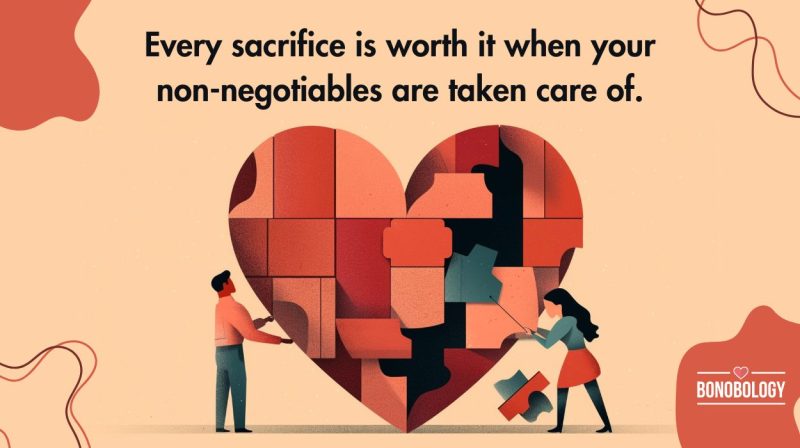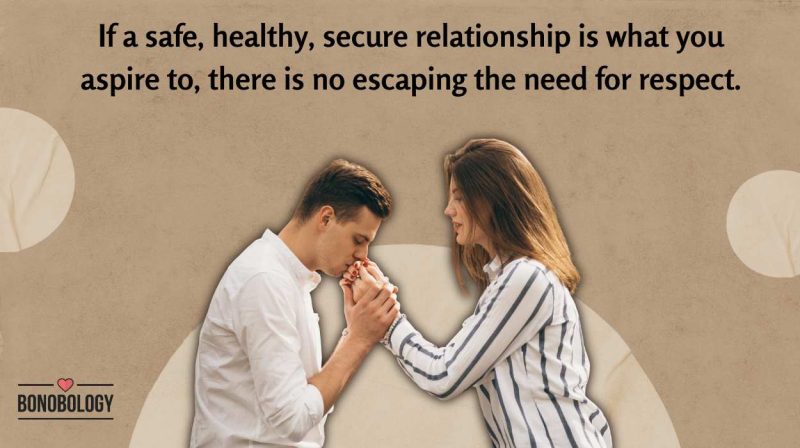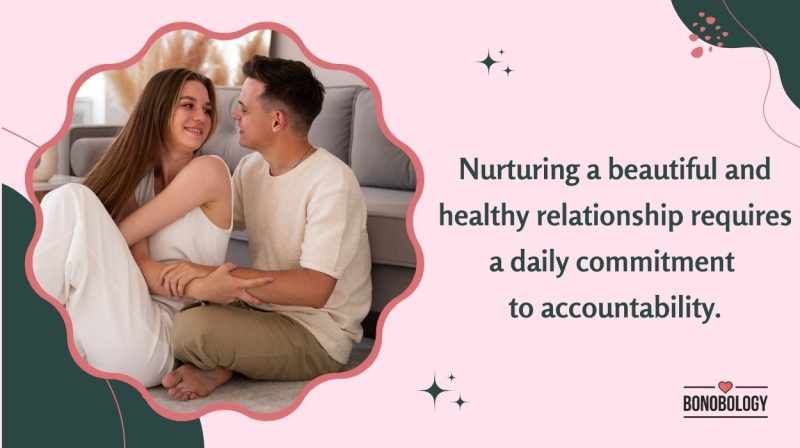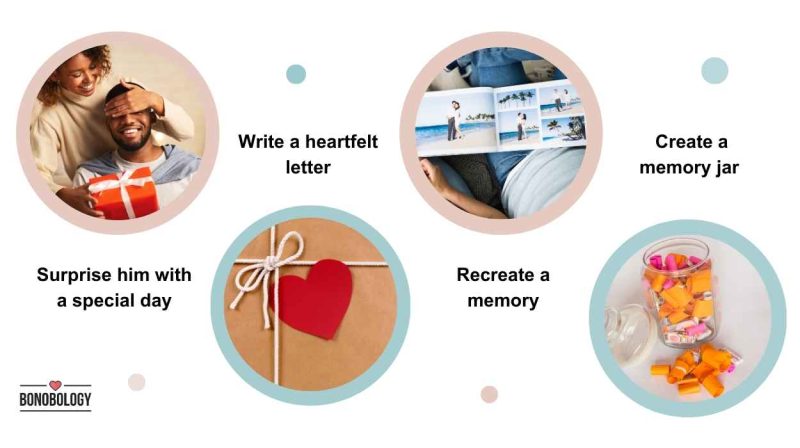Aren’t relationships all about compromises? Isn’t that what we have always known? When you find yourself in a heated conversation with your SO, torn between standing your ground or letting go of what you want, what should you actually do? Do you find a middle ground or stand up for yourself? An awareness of non-negotiables in relationships can help you out of this quandary and find a balance between fighting and letting go.
After all, that’s what successful relationships are — fun and beautiful, but also an exercise in finding balance. They are a fine dance between celebrating togetherness while preserving your individuality; compromising while having some unshakeable boundaries; loving your partner but also loving yourself.
For a better understanding of what that healthy balance looks like, we spoke to counseling psychologist Shivangi Anil (Master’s in Clinical Psychology), who specializes in premarital, compatibility, and boundary counseling. She talked to us about the importance of recognizing your boundaries, what these boundaries may look like, and tips on creating this list of non-negotiables in a relationship. Let us take it one by one.
What Are Relationship Non-Negotiables?
Table of Contents
Imagine this: A few months into a new relationship, you decide to move in together. You are excited. You trust this person. Then, one fine morning, you wake up to the sound of a loud but stifled hum. You walk down the stairs and find your partner sitting on the floor in a circle with ten other people, in what you imagine is a cult but may have been a morning mantra chanting session. No can do, sir! – you think to yourself. It’s in that instance, you realize one of your non-negotiables. “Must. Not. Be. Religious”
And that’s it! That’s what non-negotiables are. Shivangi says, “A non-negotiable is a line between something acceptable or not acceptable in a relationship; non-negotiables are unique to every relationship and are influenced by personal circumstances and societal norms.”
So, once you have figured out your deal-breakers, are you set for life? Umm. No. “As you grow, these relationship boundaries do too. They change with time,” says Shivangi. Your list of non-negotiables is as dynamic as you are. Similarly, your list may also change as the relationship progresses. What may be non-negotiable to you today in your relationship, you may be more flexible about tomorrow as you begin to trust your partner more. And that’s okay!
Why are relationship non-negotiables so important?
“It is crucial to have non-negotiable boundaries in a serious relationship because they are the line between what is acceptable and what is unacceptable. Boundaries are integral in a healthy relationship because they provide stability. They are what make the relationship sustainable,” says Shivangi. How exactly? She helped us with a few examples and laid down the following ways having non-negotiables in relationships can help you.
- Power & agency: A boundary like “I will continue to work post marriage & childbirth” allows a woman agency over her identity & professional life
- Respect: A boundary like “We will not fight in front of others” or “You will not counter me in front of your parents” makes sure your partner respects you
- A sense of safety: Something like “I feel uncomfortable with kissing in public, can we please limit it to the bedroom” allows both partners to feel safe. Or “We will never go to bed angry” allows couples to not be afraid of abandonment and feel supported when navigating conflict
- A way to fulfill your individual needs: A boundary like “We will meet our individual friends alone at least once a month” allows both partners to maintain individual friendships and fulfill their need for social connection.
Overall, non-negotiables allow for both you and your partner respect, safety, and an amenable space for growth.
Related Reading: The True List Of 19 Things Women Want In A Relationship
17 Non-Negotiables In Relationships You Must Never Compromise On
Some of the non-negotiable things in a relationship will always be unique to you. You will find them as you go along falling in love, forming bonds, falling on your face, and understanding yourself better. While many other non-negotiables are common between most couples, sort of like the cornerstones of a healthy relationship — a list of qualities of a conscious relationship.
So, what are some examples of non-negotiables in a relationship? Here is a list. Feel free to discard whatever doesn’t align with you or seems like something you don’t mind compromising over, and take what you can. We hope this list will help you figure out your deal-breakers and protect yourself from disappointments and trampled boundaries.
1. There has to be mutual respect
If you asked me, what do you look for in a relationship, my number one answer would be respect. If you find yourself in a relationship where you’re at the receiving end of your partner’s anger, your opinions are constantly disregarded, your feelings dismissed, and your boundaries violated, how long do you think the relationship would last? If it does, it is not going to be a happy relationship for sure.
You cannot foster a healthy relationship if there is a lack of respect for the person your partner is, their likes, and their life choices. Some, like myself, would even go on to say that respect for your partner is more important than love for them. Liking them for who they are, valuing their presence in your life, and feeling grateful to call them your own is what love is, isn’t it? That is what respect means and it should be the bare minimum you need in your relationship.
Related Reading: Does My Husband Respect Me Quiz
2. You would be lost without trust
The strongest bonds can crumble under the weight of uncertainty and doubt. You want your partner to be a pillar of strength. Someone you can rely on with closed eyes. You don’t want to be worrying about whether they will keep their promise, whether they have your back, whether they will not hurt you. That is why, trust is an absolute must-have in any relationship, and understanding the components of trust can help a couple go a long way.
One interesting thing to note here is that all of these points, especially the foundational non-negotiables, work in tandem with each other. Chances are if you miss 2-3 in your relationship, you actually might be missing out on much more. For example, if you found that your partner lied to you, you would not just feel hurt, you would feel disrespected. Or if you respect your partner, you wouldn’t want to lie to them. You would trust them to understand what you are going through.
3. You must feel safe in your relationship
If you asked us about 3 non-negotiables in a relationship, they would be – respect, trust, and safety. It is a person’s primary right to feel safe, secure, and free from harm whether it is physical, emotional, or psychological. Both partners should be protective of each other’s well-being. Make sure that your relationship is free from the following:
- Physical abuse and violence
- Emotional abuse
- Verbal abuse
- Manipulation and mental torture
- Fear of judgment
- Fear of punishment
- Fear of abandonment
Related Reading: 8 Signs You Are Losing Yourself In A Relationship And 5 Steps To Find Yourself Again
4. There should be a habit of communication
Nothing would ever work in any relationship, not just a romantic relationship, if people didn’t communicate things. In fact, in the case of relationships that have a lot riding on them working out, we devise elaborate plans to ascertain effective communication. Think of the professional space. Such methodical routines to communicate things — regular meetings, issuing of memos, a fixed well-thought-out language, “official communication” from the boss. Only if we paid this kind of attention to our romantic partnerships!
But it’s never too late. If you find yourself struggling on any one of the following fronts, take active steps to fix it:
- Prioritize keeping your partner informed of things so that you are both on the same page
- Update each other on what’s happening in your lives
- Talk regularly about your changing needs, desires, and boundaries
- Build a judgment-free safe space for discussions
- Focus on healthy conflict resolution
- Practice active listening, without distraction
- Make it easy to talk to your partner
5. Honesty! Honesty! Honesty!
Honesty is an absolute must for sustaining a relationship. Trust is built through a regular display of honest behavior. Lost trust is rebuilt through a relentless, often difficult display of honesty. In fact, one wouldn’t feel safe in a relationship if one couldn’t rest assured that their partner will not lie to them or cheat them.
This is a good space to bring up the question of infidelity, especially emotional infidelity. Do you know, in a survey of 1,600 British adults, 44% said that forming an emotional relationship with someone else also constituted cheating? That is how much people want to be on the same page as their partners. Ethically non-monogamous relationships work beautifully on this very principle. “If I was in the know, if I didn’t feel cheated or lied to, if he was just honest, I would not feel stupid,” my friend who broke up with a cheating partner once told me, “I might have even been okay with it.”
6. You need personal boundaries
You cannot become one with your partner by losing yourself. That is not what “two bodies, one soul” refers to. Some people around you may make you feel that it is selfish to think about your needs, your likes, your personal space, and your time. But, having the space to nurture your personality, allows you to bring your best to the relationship, positively affecting your relationship.
You especially need this kind of non-negotiable in marriage where your boundaries can easily be infringed upon. Shivangi too says, “You must have boundaries about who gets access to your personal zone, how you like your physical space, or the everyday choices you make.” Here are some examples:
- Physical space: “Clutter makes me anxious. Can we please clean up at the end of the day?”
- Personal time: “I would like to take my evening walks alone”
- Personal hobby: “I need my hour for knitting. It relaxes me”
- Personal choice: “I don’t feel like ordering from the same place. You go ahead. I will find out what I want to eat”
7. Being in a relationship of equals is your right
Your relationship has to be a relationship of equals for most of these things to work. If your partner’s needs happen to be more important than yours, how do you expect to focus on your personal growth? If you’re forever picking up behind your partner, instead of on yourself, where would you find the me-time?
The same with your opinions and your choices. Consider this a non-negotiable in marriage — “We will share equal responsibility, we will have equal say.” After all, feeling valued in a relationship should be a bare minimum standard. A partnership that focusses on fostering equality is a strong partnership in the long run.
8. Decide how you like to be touched
Boundaries around physical touch, physical intimacy, and sex are crucial. Shivangi says, “Non-negotiables around touch are about where, when, and how you choose to be touched by your partner. Similarly, sexual boundaries are about when, where, and what kind of sexual activities you are consenting to. A sexual non-negotiable could be insisting on the use of protection or refusing anal sex.”
Think of this long and hard as one of your non-negotiables in dating. How do you like being touched? And where? Are you okay with physical affection in public? Practice consent around sexual intimacy, inside and outside the bedroom. It is non-negotiable. Period.
Related Reading: What Happens When Neither Of You Asks For Consent?
9. Emotional support – An inherent need in intimate relationships
We are all fighting individual battles, no matter how many people we may be surrounded with. In one way or the other we end up looking for emotional support from our partners. In moments when we are tired of our struggles, we expect them to understand, to lend an ear, to help when help is needed, to offer a shoulder to cry on, to cheer us up, to share the load, to offer advice when advice is needed, etc. These are some basic expectations.
It is okay to prioritize what you need from your partner in distressing times. Think about what the words “emotional support” mean to you, and make sure that you are getting it in your relationship.
10. Having matching values is an important quality
Yes, opposites attract. But you need commonalities on foundational values. Values are what an individual considers important and meaningful in life. They serve as a moral compass and help guide your decisions. This is why your core values need to align. In a good relationship, couples connect over these values, so that they can make compromises on the small issues.
For example, if your and your partner’s definition of cheating is the same, you wouldn’t be left with scope for misunderstandings. On the other hand, if you both feel differently about questions like, “Is it okay to lie to spare someone their feelings?”, one of you might end up hurting the other.
Related Reading: Living Apart Together: Decoding The Latest Trend Said To Save Relationships
11. Equally important are matching beliefs
This brings us to the next point. Beliefs! Beliefs are thoughts, ideas, and convictions we hold dear. They are formed by our personal experiences, cultural background, upbringing, etc. These could be political, religious, or moral beliefs. Beliefs are influenced by values, and therefore, like values, if your beliefs differ too much from your partner’s, they can become a source of friction throughout your life.
This can be a pretty strong non-negotiable in a relationship. For example, “No matter what happens, I cannot be with a gun owner.” You could think of your boundaries surrounding beliefs, and what you can or cannot compromise with. Shivangi says, “You may not have the same religious beliefs as your partner, but you can be okay with different spiritual beliefs around you, without being forced to follow them. Or it’s okay if this is too much for you.” The thing with boundaries is, you decide what’s your relationship deal-breaker.
12. Sharing common long-term goals can make life easier
You don’t have to be “goal-oriented”, as they say, to think about goals. Goals don’t have to be about success, a house, a car, or a job. What comes to your mind when you think of your long-term goals? I think of things like:
- Do I want kids? Maybe not
- Where do I want to live? Maybe in a city that’s close to the hills
- Do I want to prioritize professional development over being with my family? If needed
- How important is my fitness going to be for me? A lot
- Do I imagine taking care of my parents in their old age? Yes
It is answers to questions like these that can be your deal-breakers. Although, I feel, that the answers to these can change over time. Our long-term relationship goals and life goals change, or we become more flexible with them. If everything else is working out well with your partner, it is not a great idea to go separate ways just because you want to retire in a city while your partner wants to go back to their childhood farm. You don’t know how either of you will feel a few years from now, let alone your retirement years.
Related Reading: 15 Examples Of SMART Goals For Relationships And How To Set Them
13. How you spend your money can be an important non-negotiable
With coupledom comes the inevitable merging of the finances. Now, there is a huge difference between saying, “My money is your money”, and actually seeing your savings being spent on something that doesn’t agree with you. Misaligned financial values and the money trauma arising from it can be a deeply unsettling issue. All of us need to feel comfortable with the way our money is spent.
When it comes to finding financial stability, what are some examples of non-negotiables in a relationship? Shivangi says, “It is about how people manage their money and whom they choose to share it with.” For the sake of clarity, let’s look at some examples of financial boundaries. These examples may help a couple avoid financial conflict in marriage.
- I would like to continue having an independent savings account
- Supporting my parents financially is my responsibility and I will continue to do that after marriage
- I feel comfortable saving at least 20% of my earning in an emergency fund
- I don’t feel comfortable investing in cryptocurrency
- I have a traumatic relationship with gambling. I cannot tolerate casual gambling and occasional betting
14. Partners must support each other’s growth
I rewrote “should support” to “must support”. And that’s what a non-negotiable is. A step up from “should” to “must”. Your ideas around what this support looks like can change, but there is no beating around the bush with this one. Partners in a relationship must look beyond their interests and help each other shine to their full potential. Here are some ways partners can do that:
- Recognize each other’s contributions, strengths, and achievements
- Offer words of encouragement and praise
- Show belief in their abilities
- Help partner access resources – financial, physical, or logistical. For example, holding the fort when they are gone or are keeping busy
- Celebrate milestones with them
- Set goals for yourself and lead by example
- Take care of each other’s physical, emotional, and mental health
Related Reading: How To Use Words Of Affirmation As A Love Language?
15. Becoming each other’s priority is important
A long-term relationship works when two people commit to making each other their priority. This demonstrates your love, respect, and commitment to the relationship. You build a strong emotional bond with them, making dealing with the ups and downs of the relationship much easier. For example, if you are in a marriage where your partner is particularly close to their family, this might not resonate with you. For you, leave and cleave boundaries can be an important non-negotiable.
16. Everybody needs privacy!
If you were raised in a big family, you might have craved privacy all your life. Or you may enjoy sharing space with other people. Regardless of how you view the line between love and privacy, it’s vital to have a conversation about it with your significant other and arrive at a middle ground about what respecting each other’s privacy would mean in your relationship.
Shivangi says, “Non-negotiables around privacy can also be about who has access to your physical things. A common privacy boundary is no checking phones or asking for email or social media passwords.” Other questions that can help you find out what kind of privacy you absolutely need are:
- Do you need a room of your own?
- Do you hate it when someone looks through your closet?
- You don’t mind sharing a bed, but do you hate it when someone stretches out your slip-ons or shares your towel?
- How do you feel about keeping a journal? Does it stress you out that someone may read it?
17. What’s a personal value you cannot do without?
Is it humor, kindness, passion, charity, or something else? For me, personally, nothing beats sensitivity and kindness. This is what makes me value my partner the most. That he is kind, not just toward me, but also to other people he comes across in his life.
Then there is also a bit of humor. He makes up jokes all day that crack me up. (Although he tells me I am the only one who laughs.) I also appreciate that he believes in charity. That comes from kindness. On top of that, his passion for his work… Before this becomes a love letter to my husband, allow me to summarize this point.
These are examples of standards in a relationship. What is something that will make you fall in love again with your partner every morning? What will you most appreciate them for? What makes you respect them for who they are? It’s clear this value is important to you! Keep this on the top of your list of non-negotiables to never feel that you are in a relationship of compromises. Every sacrifice is worth it when your non-negotiables are taken care of.

Tips For Figuring Out Your Non-Negotiables
Some of this advice you can follow to the T, and some you may have to figure out on your own. But is the only way to learn about your musts a trial-and-error method? Does it always have to come down to receiving a blow in your face to figure out what you can never compromise on? Not necessarily. Shivangi helps us with invaluable tips to ascertain what our non-negotiables in relationship are going to be like.
1. Know your authentic self
“From a judgment-free space try to find out who you are. Understand what you value the most and what are some things you are willing to compromise with. You could list out the values you want to live by in the future, the actions required for that, and the limits you need to set. These limits are your non-negotiables,” says Shivangi.
Engage in some TLC, some self-love. This will help you be in tune with your emotional response system and your intuition.
2. Identify your core values
What qualities, principles, or behaviors do you consider essential in a partner? These are your core values and things you cannot compromise with. A person’s values can be made clear and brought to the front through introspection. Shivangi gives some prompts that may help:
- What values did I get from my primary caregivers?
- What values would I like to live by?
- Which of these am I living by today?
- What according to me are some important values in a relationship?
Related Reading: Freedom In Relationships – What It Means And What It Doesn’t
3. Reflect on past relationships
“All the boys you’ve loved before” and the “ghosts of girlfriends past” are there for a reason! Spend time thinking about the dates you have been on, the previous relationships that worked, and the ones that failed. Think about the questions that follow. These work great at figuring out your non-negotiables in a relationship.
- What were the things that made you dissatisfied, uncomfortable, or conflicted?
- What were the things that made you stick around?
- What are the characteristics of a healthy relationship?
- What’s your ideal relationship?
- What are some ideal partner qualities?
- Write an ideal partner description
- Create a wants and needs list in a relationship
4. Observe other people
Look around! There are relationships all around you. The great ones, the boring ones, the miserable ones, the disasters, the ones you feel pity for, the ones that make you jealous. There is something to learn from all of these. What are the qualities that contribute to the success of good relationships? Do these align with your values? That’s your cue to find out what do you want in a relationship and create the list of non-negotiables in relationship.
5. Trust your gut
If you don’t like something and find it hard to let go, chances are that something about it is in huge conflict with something very important to you. That is your non-negotiable. This is often not apparent and can be difficult to dig up from a mess of tangled emotions. But if you do the work — self-awareness, mindfulness, self-reflection, journaling, patience, and if needed, therapy, you may just locate that value. Once you do, you can avoid the unnecessary pressure of finding a compromise where you should be putting your foot down.
Key Pointers
- Non-negotiables in dating, love, and marriage are things that are absolutely important to you
- Respect, trust, and security are 3 non-negotiables in a relationship that are of utmost importance, along with having similar interests, values, and beliefs
- Some of these bare minimum standards are foundational in nature. Others are unique to the couple
- Figuring out your non-negotiables in a relationship is not difficult. With some introspection, reflecting on past experiences, and observing other people, you can find the qualities in a relationship that resonate the most with you
- Prioritizing yourself and spending time in self-reflection will help you find your values and guide your non-negotiables
Only you decide which core needs in a relationship are your top priority! Is respecting each other’s family important to you? Are you a vegan and can’t be with a meat-eater? Does jealousy make you extremely uncomfortable? Go ahead, make your list. And then stand your ground, stick to it! That is the secret to a successful relationship.
12 Things To Do When Your Husband Chooses His Family Over You
Emotional Integrity In Relationships – A Missing Piece In The Jigsaw Of Fulfillment?
Your contribution does not constitute a charitable donation. It will allow Bonobology to continue bringing you new and up-to-date information in our pursuit of helping anyone in the world to learn how to do anything.























Featured
6 Tips for Helping Your Partner Quit Smoking in Their 50s
How He Treats You Is How He Feels About You — Is It True?
How To Let Someone Down Easy With Kindness And Grace — 13 Tips
How To Show Respect In A Relationship — 9 Ways
The Pitfalls Of Nice Guy Syndrome: How It Affects Relationships
Navigating The Complexities Of Consent In Modern Relationships
11 Ways To Deal With A Sexually Demanding Husband
Accountability In Relationships – Meaning, Importance, And Ways To Practice
How To Apologize To Your Boyfriend: 15 Ways
10 Thought-Provoking Relationship Check-In Questions for Deeper Connection
Is A Monogamous Relationship Right For You? 11 Questions To Help You Find Out
10 Signs You Are In A Truly Stable Relationship (Even If You Feel Otherwise)
7 Subtle Signs Your Partner is Quiet Quitting Your Relationship
Secure Relationships – What Are They And What Do They Look Like?
Physical Touch Love Language: What It Means With Examples
Do I Like Him Or The Attention? Ways To Find Out The Truth
15 Ways To Solve Relationship Problems Without Breaking Up
9 Common Narcissist Gaslighting Examples We Hope You Never Hear
The Most Important 7 Qualities Of A Healthy Relationship
15 Early Signs He Is A Player And Isn’t Serious About You